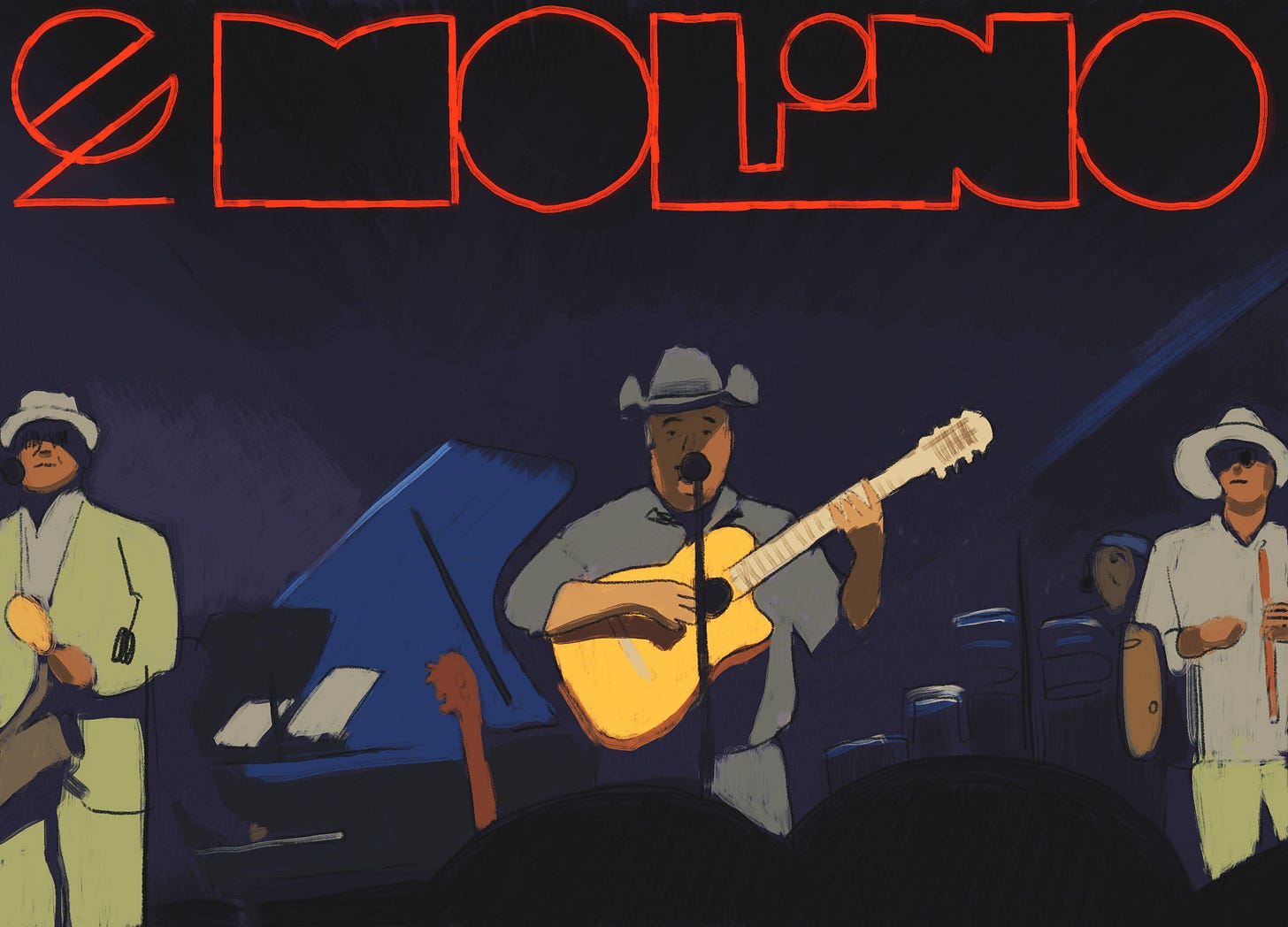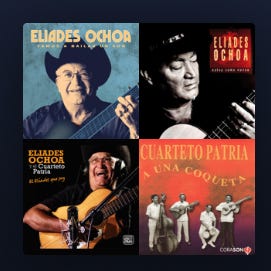
To listen to a playlist music by Eliades Ochoa, read down to the end of the story.
Eliades Ochoa opened his show in Barcelona last week with a song from his latest album called “Vamos a alegrar el mundo” (“We’re Going to Cheer Up the World”). Like other Cuban country songs in the traditional style of which Ochoa is the most prominent surviving interpreter, the lyrics were a model of in-the-moment-mindfulness, delivered in lyrics like “Have a beer, and bring me a glass of rum.” The brightening effect on the audience was immediate.
There’s comfort in knowing that some things stay the same. Ochoa still, as always, wears a Stetson-sized cowboy hat and patent leather shoes. And his concerts can feel pretty much as they were before the fame that Ry Cooder’s Buena Vista Social Club album and the ad-hoc group’s filmed concert at Carnegie Hall brought him at the end of the 1990s. Now, at age 78, his concerts at smaller venues – like the one I went to last week- recall those of pre-Buena Vista days, when he could be found sipping his glass of rum at a back table at Santiago’s Casa de la Trova when he was not playing on the small stage there in that community house of music in Eastern Cuba.
“What’s going to happen is this,” he told the crowd seated on velvet banquettes and around cocktail tables on March 21 at El Molino, a club that feels like a sublime illusion that recently opened in the landmark space of the Barcelona’s most famous turn-of-the-20th-century cabaret.
“I’ll play what I know, and you tell me what you want to hear.”
Of course one of those songs was “Chan Chan,” written by Compay Segundo, which Ochoa had recorded with his longtime band Cuarteto Patria before it became an unexpected runaway hit.
For Ochoa, it’s just another standard of his repertoire, a container for his own memories that happens to be shared with the planet’s collective consciousness.
“That song will never die because of the Buena Vista Social Club,” Ochoa mused quietly before striking a chord on his eight-string guitar - a custom hybrid between a Cuban tres and Spanish guitar - to move into the next number. There was no need for him to remark further about that phenomenon or explain it. He’s always known the power of the traditional Cuban son.
"The son is very simple," he explained to me one long-ago Sunday in Santiago, soon after he had traveled to Havana to participate in the Buena Vista recording but when he still could not have imagined the impact it would have. "It's a tres, some bongos, a pair of claves, some maracas. The music shouldn't be written down, and the musicians playing it don't have to know each other. We just get together and I grab a tres, another guy grabs the bongos, another the maracas. And there's the son. That's all you need."
Ochoa is currently performing with younger Cuban musicians who bring other instruments and a louder energy to the music. During the concert, pianist Eduardo Pineda took every opportunity to unrein his fingers over the keyboard with the combined urban swagger and classical virtuosity that is the signature of contemporary Cuban players. Sax player Angel Aguiar, who also played maracas, acted as MC, leading the audience in rounds of clapping and getting everyone up to dance. The group also included bass player Santiago Félix Giménes, percussionist Angel Herrera and trumpet and guiro player Frank Maella.
Ochoa stood in the center, undistracted by the crowd-pleasing moves of his musicians. Staying true to his reputation as the Cuban Johnny Cash, he was dressed in black, the silver sequins on his Western shirt sparkling.
During the show, his naturally hoarse singing voice never waivered, nor did his humble demeanor.
“Nobody brought the records,” he said from the stage, visibly disconcerted that the albums that he was supposed to sign had somehow not made it to the theater and there would be no merch table that evening. “Maybe someone out there can find the record and buy it, and you’ll be able to listen to it at home.” He wasn’t joking.
The songs in Ochoa’s repertoire evoke rural landscapes, and tell symbolic, simple stories about hard lives. His own life story is similarly pictorial: he was a poor boy who shined shoes as a child, then began playing his guitar and singing in the local bordello for spare change. His luck changed when he was hired to play on the radio and make a modest living from his music.
During the concert, he introduced the songs. He also told some corny jokes, mostly about his wife telling him to stop talking so much between songs. While his vocals didn’t falter, true to his statement that musicians don’t have to know each other to play together, he seemed to have trouble remembering his band members’ names, calling them “el señor del bajo” or el pianista mágico.” It also took him a minute to recall the title of his latest album (“Guajiro”), or the Madrid rapper with whom he collaborated on a popular song that brought his voice to young audiences (C. Tangana).
He didn’t have a problem acknowledging his senior moments. “My audiences give me the strength to continue,” he said. “You are what keeps me healthy.” Members of the crowd joined him in singing “Estoy como nunca,” (“I’m better than ever”), which is one of my favorite empowerment anthems. Later, they looked the other way when a club employee took Ochoa’s hand and helped him find the way backstage.
Age does have its privileges, some of them onstage. Ochoa finally came out with his band for an encore that was hard won by the cheering crowd. But he was tired. He had sung his piece. Before the last song was over, he suddenly took off his guitar and laid it on top of the piano. And with that, the great Eliades Ochoa, the last of a breed, walked off the stage.
Listen to my playlist of Eliades Ochoa’s songs on Qobuz:
Listen on Spotify:







